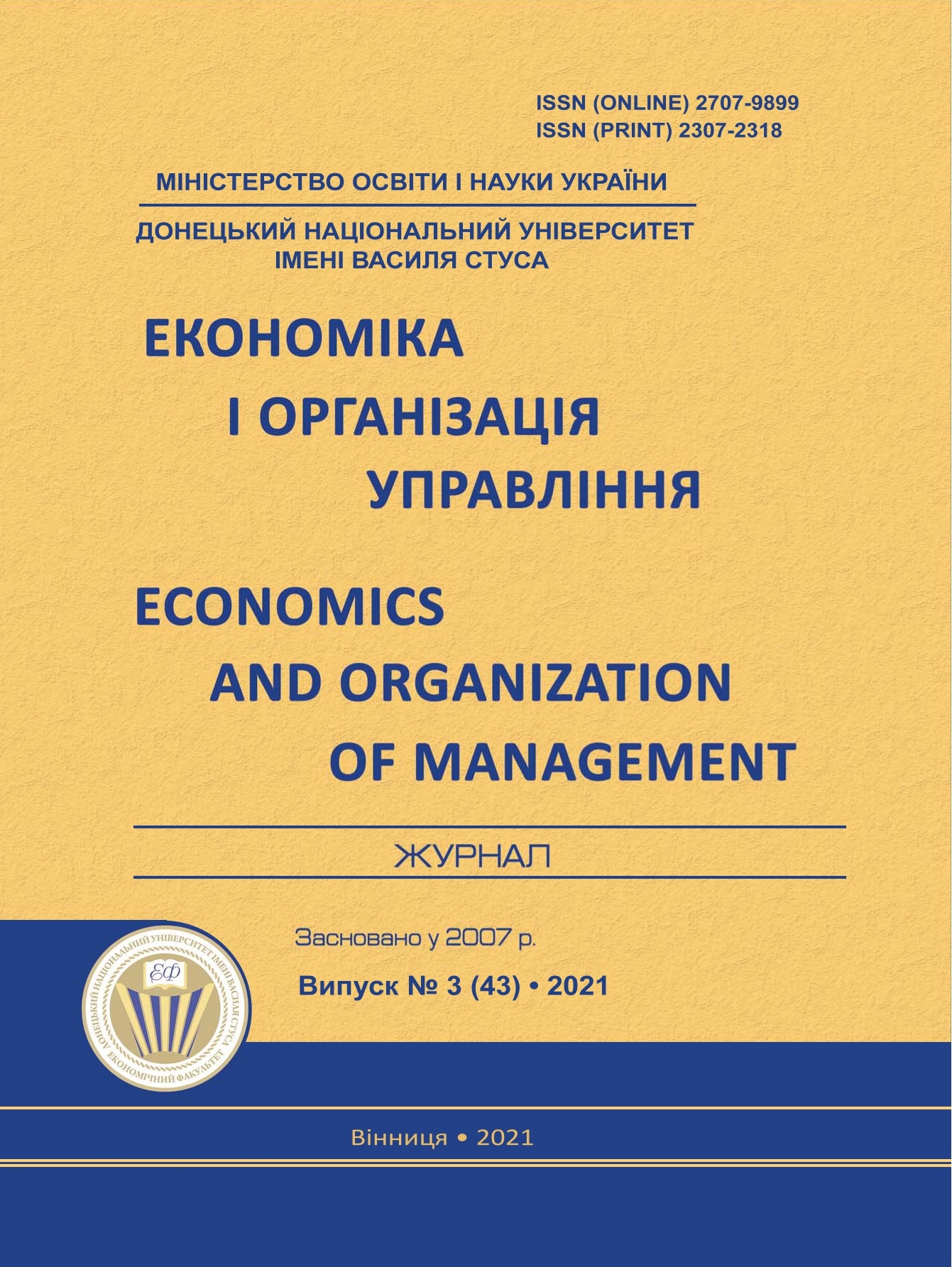Імплементація людиноорієнтованого підходу в систему забезпечення економічної безпеки країни
DOI:
https://doi.org/10.31558/2307-2318.2021.3.20Ключові слова:
економічна безпека; людиноорієнтований підхід; інклюзивне економічне зростання; публічна політикаАнотація
Визначено основні характеристики людиноорієнтованого підходу в сфері економічної безпеки. Виокремлено комплекс характеристик, що набувають особливої актуальності в епоху четвертої наукової революції й нової економіки та мають бути враховані під час імплементації у публічну політику держави. Систематизовано основні погляди на трактування безпеки в контексті людиноорієнтованого підходу. Обґрунтовано, що елемент безпеки, який характеризує «свободу від нужди» ототожнюється із економічною безпекою країни, яка має фокус на людину. Доведено, що така безпека невід’ємно асоціюється зі «свободою вибору» або можливостями для розвитку, цінностями та захистом життєво важливого ядра. Зазначено основні положення нової економічної теорії, які є комплементарними із людиноорієнтованим підходом до економічної безпеки країни. Надано оцінку впровадженим стратегіям із основних напрямів національної безпеки України. Обґрунтовано необхідність пошуку перетину парадигми економічної безпеки і розвитку людського капіталу, інклюзивного економічного розвитку.
Посилання
Annan K., Secretary-General Salutes International Workshop on Human Security in Mongolia. Two-Day Session in Ulaanbaatar, May 8-10, 2000. Press Release SG/SM/7382. URL: https://www.un.org/press/en/2000/20000508.sgsm7382.doc.html.
Thomas C. Global Governance, Development and Human Security: The Challenge of Poverty and Inequality. Human Security in The Global Economy. London: Pluto Press, 2000, p. 3.
Organisation for Economic Co-operation and Development (OECD), “Income inequality and labour income share in G20 countries: Trends, Impacts and Causes”, Prepared for the G20 Labour and Employment Ministers Meeting and Joint Meeting with the G20 Finance Ministers, Ankara, Turkey, 3-4 September 2015. URL: https://www.oecd.org/g20/topics/employment-and-social-policy/Income-inequality-labourincome-share.pdf
Krause E., Sawhill I. Seven Reasons to Worry About the American Middle Class, Social Mobility Memo, June 5, 2018. URL: https://www.brookings.edu/blog/social-mobilitymemos/2018/06/05/seven-reasons-to-worry-about-the-american-middle-class/.
Huwart J.-Y., Verdier L. The 2008 Financial Crisis – a Crisis of Globalisation? Economic Globalisation: Origins and Consequences, OECD Publishing, Paris, 2013. URL: https://www.oecd-ilibrary.org/docserver/9789264111905-9- en.pdf?expires=1630936471&id=id&accname=guest&checksum=98E31452B4C8E0EDA946 4AD2898A83B9.
Stiglitz J. People, Power and Profits, London: Allen Lane, 2019.
Edelman. 2017 Edelman Trust Barometer, Global Annual Study. URL: http://www.edelman.com/trust2017/.
Samans R., Davis N. Advancing Human-Centred Economic Progress in the Fourth Industrial Revolution. A Leadership Agenda for G20 Governments. World Economic Forum, 2017, p. 9. URL: http://www3.weforum.org/docs/WEF_Advancing_Human_Centred_Economic_Progress_WP _2017.pdf
Kerr P. The Evolving Dialectic between State-Centric and Human-Centric Security. 2003. URL: https://core.ac.uk/download/pdf/156615473.pdf
Krause K., Theorizing security, state formation and the “Third World” in the post-Cold War world. Review of International Studies, Volume 24, Issue 1, January 1998, p. 126.
Buzan, ‘Human security: What it means’, p.8
Khong Y. F. Human security: a Shotgun Approach to Alleviating Human Misery? Global Governance. Vol. 7, No. 3 (July–Sept. 2001), P. 235. URL: https://www.jstor.org/stable/27800301
Bosold D., Werthes S. Human Security in Practice: Japanese and Canadian experiences. Internationale Politik und Gesellschaft, no. 1, 2005, pp. 84-10
Floyd R. Human Security and the Copenhagen School’s Securitization Approach: Conceptualizing Human Security as a Securitizing Move. Human Security Journal, vol. 5, no. 37, 2007, pp. 38–49.
Hampson F. The Many Meanings of Human Security. In F. Hampson and J. Daudelin (eds.). Madness in the Multitude. Toronto: Oxford University Press. 2001, 216 p.
Nef J. Human Security and Mutual Vulnerability: the Global Political Economy of Development and Underdevelopment. Canada: International Development Research Centre, 1999. URL: https://idl-bnc-idrc.dspacedirect.org/bitstream/handle/10625/21995/IDL21995.pdf?sequence=5&isAllowed=y.
Nagan Winston P. The Concept, Basis and Implications of Human-Centered Development. Cadmus Journal. Volume 3 - Issue 1, October 2016. URL: http://cadmusjournal.org/files/pdfreprints/vol3issue1/cadmus-v3-i1-human-centereddevelopment-wnagan-reprint.pdf
Buzan B. Peoples, States and Fear, Brighton:Wheatsheaf; Ullman, R., «Redifi ning Security», International Security, Vol. 8, no. 1, 1983, pp. 129-153; Jahn E., Lemaitre P., Waever O., Concepts of Security. Problems of Research on Non-Military Aspects, Copenhaguen Papers no. 1, 1987. Copenhaguen:Cnetre for Peace and Confl ict Research; Nye J.S. and Lynn-Jones S.M., «International Security Studies», International Security, Vol.12, no. 4, 1988. pp. 5-27.
Mahbub ul-Haq. Global governance for human security, in Tehranian, ed., Worlds apart, p. 83.
Jensen F. The Practice of Human Security Theory. A case study of US and EU policy in the middle East and North Africa, 2006.
Стратегія національної безпеки України. Безпека людини – безпека країни, затверджена Указом Президента України від 14 вересня 2020 року № 392/2020
Стратегія економічної безпеки України на період до 2025 року, затверджена Указом Президента України від 11 серпня 2021 року № 347/2021
Стратегія людського розвитку, затверджена Указом Президента України від 2 червня 2021 року №225/2021
Buzan, B. 1991. People, States and Fear: An Agenda for International Security Studies in the Post-Cold War Era. Essex: Longman.
Buzan B., Waever O., de Wilde J. Security. A New Framework For Analysis, Boulder/London: Lyenne Rienner, 1998. 237 p.
Alkire A. Conceptual Framework for Human Security. CRISE Working Paper, no. 2, 2003, p. 13.
Thakur R. Human security regimes, in Tow, Thakur and Hyun, eds, Asia’s emerging regional order, p. 231.
Hampson F.O., Daudelin J., Hay J.B., Martin T., Reid H. Madness in the Multitude: Human Security and World Disorder. Ottawa 2002. p. 4.
Hampson, F. 2001. ‘The Many Meanings of Human Security’, in F. Hampson and J. Daudelin, eds, Madness in the Multitude. Toronto: Oxford University Press.
UNDP. Human development report 1994. United Nations Development Programme, 1994), New York. Available at: http://hdr.undp.org/sites/default/files/reports/255/hdr_1994_en_complete_nostats.pdf.
Commission on Human Security, Human Security Now: Protecting and empowering people. Report of the Commission on Human Security, 2003. Available at: https://reliefweb.int/report/world/human-security-now-protecting-and-empowering-people
UN General Assembly. World Summit Outcome : resolution / adopted by the General Assembly, 24 October 2005, A/RES/60/1. URL: https://www.refworld.org/docid/44168a910.html.
Khong Y. Human security: A shotgun approach to alleviating human misery?, Global Governance 7(3) 2001, pp. 231–6
World Economic Forum, Global Agenda Council on Values, “A New Social Covenant”, 23-27 January 2013. Available at http://www3.weforum.org/docs/WEF_GAC_Values_2013.pdf
Nagan W. The Concept, Basis and Implications of Human-Centered Development, World Academy of Art & Science; Sam T. Dell Research Scholar of Law, University of Florida, Gainesville, USA
Quality of life indicators - measuring quality of life. Available at: https://ec.europa.eu/eurostat/statistics-explained/index.php?title=Quality_of_life_indicators_- _economic_security_and_physical_safety#General_overview
Thakur R. The United Nations and Human Security: Incoherent Concept or Policy Template?, open lecture on the premises of Altes Rathaus Bonn Markt, Bonn International Centre of Conversion (BICC) and the Bonner Freundeskreis Vereinte Nationen, 2006, 9 March. Available at: at http://www.bicc. de/events/vortraege_2006/thakur.pdf, p. 3.
Quest for a New Paradigm in Economics A Synthesis of Views of the New Economics: Working Group. Available at: http://cadmusjournal.org/files/pdfreprints/vol3issue2/Reprint-Cadmus-V3-I2-New-ParadigmEconomics-GJacobs-MSwilling-etal.pdf

